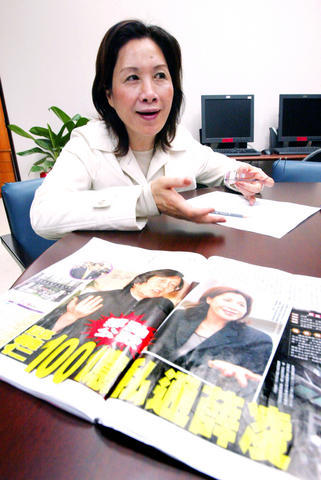Government officials yesterday clarified accounts following a media report that said the state-owned Taiwan Post Co was asked by the government to deposit NT$10 billion (US$324 million) in a bank affiliated with a Democratic Progressive Party (DPP) lawmaker.
The latest issue of Next magazine published yesterday reported that Vice Premier Chiou I-jen (邱義仁) demanded Taiwan Post deposit NT$10 billion in Sunny Bank (陽信銀行), one day after DPP Legislator Hsueh Ling (薛凌) and her husband Chen Shen-hung (陳勝宏) were charged with involvement in a loan scandal at the bank last year.
Chen, a former DPP lawmaker, is chairman of the bank.

PHOTO: CNA
The report said Taiwan Post deposited NT$37 billion in some questionable banks, NT$10 billion of which was deposited in Sunny Bank. The bank has only returned NT$6.5 billion after Chiou had Taiwan Post defer payment four times.
clarification
Executive Yuan spokesman Shieh Jhy-wey (
"It's wrong to accuse the government of aiding Sunny Bank. The government will work out a plan for Sunny Bank to repay the loan interest and principal with the bank. The allegation of the report was unfair to the bank and to the government," Shieh said.
"When a bank is having a financial crisis, the government has the obligation to step in to keep depositors of the banks from suffering losses," he said.
When approached by reporters outside the Executive Yuan, Chiou also dismissed the allegation made by the report that he embezzled the Taiwan Post fund to aid Hsueh.
Earlier yesterday at a press conference, Chinese Nationalist Party (KMT) caucus whip Lin Yi-shih (林益世) called the postal company's decision into question, saying that Sunny Bank's credibility had been sabotaged after suffering from an alleged embezzlement scandal last year, in which Hsueh and Chen were charged with seeking illegal loans with fake documents from the Sunny Bank.
Lin questioned postal company president Wu Min-yu (吳民佑), who attended the conference, over whether DPP presidential candidate Frank Hsieh (謝長廷) had received the money as a campaign contribution.
In response, Wu confirmed the magazine's report, but denied that Chiou was responsible for the company making the deposit.
He said the postal company did not take the initiative to put the money in Sunny Bank until officials from the company participated in a meeting presided over by the Banking Bureau, under the Financial Supervisory Commission, and the Central Deposit Insurance Co.
tight-lipped
Meeting participants prompted the decision to have the Taiwan Post Co store the money in Sunny Bank in a bid to "maintain overall financial order," Wu said. He remained tight-lipped, however, when asked by KMT legislators regarding details of the meeting.
At a separate setting yesterday, Ministry of Transportation and Communications Vice Minister Ho Nuan-hsuen (
Taiwan Post currently keeps part of the postal fund at 34 state-run and private banks. The postal fund has topped NT$4 trillion, but only NT$722.5 billion are saved in these banks, he said.
Ho said that the Sunny Bank has a rating of AAA- and is rated B by the post office itself. The amount saved in Sunny Bank is approximately NT$9.5 billion.
In addition to Sunny, Ho said that the Taiwan Post also has savings in the Chinese Bank (中華商業銀行), Bowa Bank (寶華銀行), Asia Trust (亞洲信託) and other banks.
Additional reporting by Shelley Shan

A strong continental cold air mass is to bring pollutants to Taiwan from tomorrow, the Ministry of Environment said today, as it issued an “orange” air quality alert for most of the country. All of Taiwan except for Hualien and Taitung counties is to be under an “orange” air quality alert tomorrow, indicating air quality that is unhealthy for sensitive groups. In China, areas from Shandong to Shanghai have been enveloped in haze since Saturday, the ministry said in a news release. Yesterday, hourly concentrations of PM2.5 in these areas ranged from 65 to 160 micrograms per cubic meter (mg/m³), and pollutants were

Taiwan’s armed forces have established response protocols for a wide range of sudden contingencies, including the “Wan Chun Plan” to protect the head of state, the Ministry of Defense (MND) said today. After US President Donald Trump on Saturday launched a series of airstrikes in Venezuela and kidnapped Venezuelan President Nicolas Maduro, concerns have been raised as to whether China would launch a similar “decapitation strike” on Taiwan. The armed forces regularly coordinate with relevant agencies and practice drills to ensure preparedness for a wide range of scenarios, Vice Minister of National Defense Hsu Szu-chien (徐斯儉) told reporters before a

EVA Airways on Saturday said that it had suspended a pilot and opened an investigation after he allegedly lost his temper and punched the first officer several times as their plane was taxiing before takeoff at Los Angeles International Airport. According to a report published on Thursday by The Reporter, the incident occurred after the flight’s Malaysian first officer tried to warn the Taiwanese pilot, surnamed Wen (文), that he was taxiing faster than the speed limit of 30 knots (55.6kph). After alerting the pilot several times without response, the first officer manually applied the brakes in accordance with standard operating

Japanese Councilor Hei Seki (石平) on Wednesday said that he plans to visit Taiwan, saying that would “prove that Taiwan is an independent country and does not belong to China.” Seki, a member of the Japan Innovation Party, was born in Chengdu in China’s Sichuan Province and became a naturalized Japanese in 2007. He was elected to the House of Concilors last year. His views on the Chinese Communist Party (CCP) — espoused in a series of books on politics and history — prompted Beijing to sanction him, including barring Seki from traveling to China. Seki wrote on X that he intends